Link (Archive)

I remember walking into the Juicy Couture outlet store like it was yesterday – a shiny, pink embodiment of the phrase “that’s hot.” It somehow felt inspiring and depressing all at the same time. As a then-awkward preteen with lumps and bumps in all of the “wrong” places, this store was everything that I wanted to be, but wasn’t.

Juicy Couture wasn’t an outlier. The fashion trends of the early aughts — when low-rise denim and tight-fitting velour pants with words like sexy splayed across the back were the cool thing to wear — were often exclusive of teens with larger bodies. Whether the clothes didn’t come in our sizes, or magazines offered tips on how to lose weight to better fit the trends of the day, young people like me were often othered. Popular clothing at the time felt not just ill fitting, but like a statement on whether or not we belonged.
As Y2K style makes a comeback, many have decried the trends as fatphobic — low rise jeans and crop tops, some say, aren’t inclusive of fat bodies. Fatphobia was, certainly, part of the trend in the early 2000s. It was hard to watch a show, read a magazine, or just exist in the world without seeing some commentary on what kind of body was good, and that seemed reinforced by the clothes that were popular at the time.
But acknowledging that the origins of a fashion trend are inherently and historically fatphobic should not necessarily translate to never participating in them, especially if you want to. To me it means that we should participate in them as a small act of reclamation.
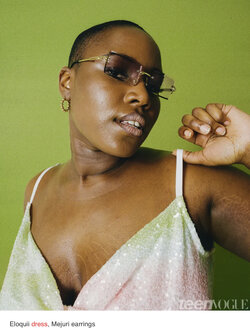


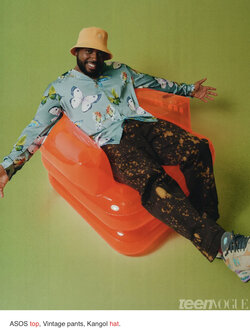
Writer, host and creator of Big Calf podcast, Amanda Richards tweeted in May, “Do not talk to me about Y2K revival unless you’re willing to admit you’re nostalgic for a time when fat people were not allowed to have clothes." She continued, "Sure it seems like fun and games now, but the reality is that Y2K fashion was all about scanning a deLiA*s catalogue and then feeling like shit for approximately 10-15 years.”
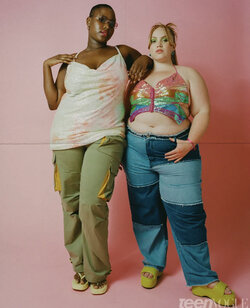
In the early 2000s, fatphobia seemed like an unavoidable accessory to the trends we embraced. Not only were these items largely not available in our sizes, most fat teens would likely not have been accepted wearing them even if they had been. This is, in part, evidenced by the myriad articles directing young people on how to lose weight, tone their muscles, and adapt their bodies to the clothes teen magazines at the time sold. Or perhaps in the fatphobia common in TV shows, movies, and all other sorts of pop culture from that era. (All of this, of course, didn’t just impact fat teens, but contributed to negative body image in people of all sizes.)
Journalist Jess Sims wrote in Harpers Bazaar that the trends seemed to cater to a certain body type: ”Y2K fashion trends—with their emphasis on low-rise jeans; exposed thongs; and baby tees—were understood to celebrate a very specific body type, one generally found in teenaged girls,” Sims wrote. This, she argued, started many young women “unknowingly embarking on a lifelong pursuit of youth and thinness.”


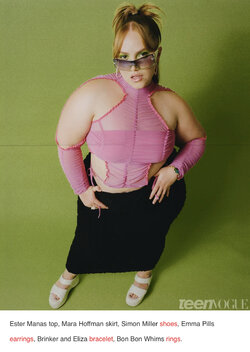
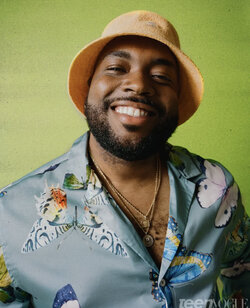
Ads and runways showcasing the trends also sent another message. In an article called The Fatphobic & Racist Origins of Y2K Fashion Trends, Aishwarya Jagani cites Sabrina Strings in Fearing the Black Body: The Racial Origins of Fat Phobia, in which she explains how “Y2K fashion’s emphasis on thinness…erased the creative contributions of the Black community, attributing styles popularized by people of color to the white celebrities of the time.” The popular image of the day was of thin, white women, further limiting what society saw as beautiful.
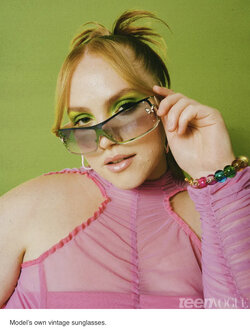
Given the problematic history of Y2K fashion, the visceral reaction many online had to its resurgence is completely understandable. A ticker tape of past tabloid headlines boasting about how to lose weight fast, and how much weight the latest celebrity had gained (or lost) ran through our minds like rapid fire. Some quickly recalled dark memories of blatant fatphobia, racism, dangerously-thin runway models, as well as their own experiences with past eating disorders – all of which had been perpetuated by unrealistic media standards for years.
But, it’s not necessarily the clothes that were fatphobic and exclusive — it was, and continues to be, our attitudes about who was allowed to wear them.
Since the early aughts, we’ve made some progress in fat acceptance. Runways have become more diverse both in race and size; social media has opened the doors for fat bloggers and models; and it’s become less acceptable to include fatphobia in media.
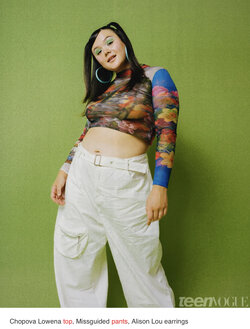
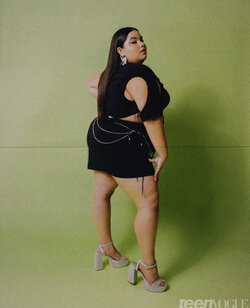

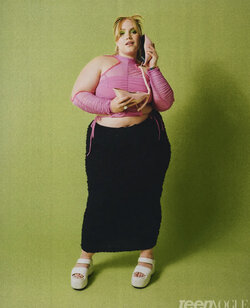
Of course, society hasn’t fully embraced fatness, or seeing certain clothing styles on different body types, which is further fueled by the limited media representation fat people get. The messaging is still not perfect, and fat people still face discrimination.

But that’s exactly why we shouldn’t perpetuate it by policing trends based on who we think they look best on. Y2K trends aren’t inherently exclusive of fat people (as long as they come in our size), our ideas of who looks good in them are.
With that in mind, I’d like to think that we are now in a time of acknowledging our past traumas, and then reclaiming them on our own terms as a form of self therapy. As people living in fat bodies, we were excluded from so many things, for so long – the Y2K trend being one of them – and continuing to adhere to those narratives gives power to the systems that for so long excluded us.
It is our time — wear the damn crop top, because that’s really hot.
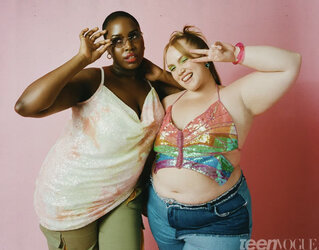
The Y2K Style Trend Isn't Fatphobic, Our Attitudes About it Are

I remember walking into the Juicy Couture outlet store like it was yesterday – a shiny, pink embodiment of the phrase “that’s hot.” It somehow felt inspiring and depressing all at the same time. As a then-awkward preteen with lumps and bumps in all of the “wrong” places, this store was everything that I wanted to be, but wasn’t.

Juicy Couture wasn’t an outlier. The fashion trends of the early aughts — when low-rise denim and tight-fitting velour pants with words like sexy splayed across the back were the cool thing to wear — were often exclusive of teens with larger bodies. Whether the clothes didn’t come in our sizes, or magazines offered tips on how to lose weight to better fit the trends of the day, young people like me were often othered. Popular clothing at the time felt not just ill fitting, but like a statement on whether or not we belonged.
As Y2K style makes a comeback, many have decried the trends as fatphobic — low rise jeans and crop tops, some say, aren’t inclusive of fat bodies. Fatphobia was, certainly, part of the trend in the early 2000s. It was hard to watch a show, read a magazine, or just exist in the world without seeing some commentary on what kind of body was good, and that seemed reinforced by the clothes that were popular at the time.
But acknowledging that the origins of a fashion trend are inherently and historically fatphobic should not necessarily translate to never participating in them, especially if you want to. To me it means that we should participate in them as a small act of reclamation.




Writer, host and creator of Big Calf podcast, Amanda Richards tweeted in May, “Do not talk to me about Y2K revival unless you’re willing to admit you’re nostalgic for a time when fat people were not allowed to have clothes." She continued, "Sure it seems like fun and games now, but the reality is that Y2K fashion was all about scanning a deLiA*s catalogue and then feeling like shit for approximately 10-15 years.”

In the early 2000s, fatphobia seemed like an unavoidable accessory to the trends we embraced. Not only were these items largely not available in our sizes, most fat teens would likely not have been accepted wearing them even if they had been. This is, in part, evidenced by the myriad articles directing young people on how to lose weight, tone their muscles, and adapt their bodies to the clothes teen magazines at the time sold. Or perhaps in the fatphobia common in TV shows, movies, and all other sorts of pop culture from that era. (All of this, of course, didn’t just impact fat teens, but contributed to negative body image in people of all sizes.)
Journalist Jess Sims wrote in Harpers Bazaar that the trends seemed to cater to a certain body type: ”Y2K fashion trends—with their emphasis on low-rise jeans; exposed thongs; and baby tees—were understood to celebrate a very specific body type, one generally found in teenaged girls,” Sims wrote. This, she argued, started many young women “unknowingly embarking on a lifelong pursuit of youth and thinness.”




Ads and runways showcasing the trends also sent another message. In an article called The Fatphobic & Racist Origins of Y2K Fashion Trends, Aishwarya Jagani cites Sabrina Strings in Fearing the Black Body: The Racial Origins of Fat Phobia, in which she explains how “Y2K fashion’s emphasis on thinness…erased the creative contributions of the Black community, attributing styles popularized by people of color to the white celebrities of the time.” The popular image of the day was of thin, white women, further limiting what society saw as beautiful.

Given the problematic history of Y2K fashion, the visceral reaction many online had to its resurgence is completely understandable. A ticker tape of past tabloid headlines boasting about how to lose weight fast, and how much weight the latest celebrity had gained (or lost) ran through our minds like rapid fire. Some quickly recalled dark memories of blatant fatphobia, racism, dangerously-thin runway models, as well as their own experiences with past eating disorders – all of which had been perpetuated by unrealistic media standards for years.
But, it’s not necessarily the clothes that were fatphobic and exclusive — it was, and continues to be, our attitudes about who was allowed to wear them.
Since the early aughts, we’ve made some progress in fat acceptance. Runways have become more diverse both in race and size; social media has opened the doors for fat bloggers and models; and it’s become less acceptable to include fatphobia in media.




Of course, society hasn’t fully embraced fatness, or seeing certain clothing styles on different body types, which is further fueled by the limited media representation fat people get. The messaging is still not perfect, and fat people still face discrimination.

But that’s exactly why we shouldn’t perpetuate it by policing trends based on who we think they look best on. Y2K trends aren’t inherently exclusive of fat people (as long as they come in our size), our ideas of who looks good in them are.
With that in mind, I’d like to think that we are now in a time of acknowledging our past traumas, and then reclaiming them on our own terms as a form of self therapy. As people living in fat bodies, we were excluded from so many things, for so long – the Y2K trend being one of them – and continuing to adhere to those narratives gives power to the systems that for so long excluded us.
It is our time — wear the damn crop top, because that’s really hot.
